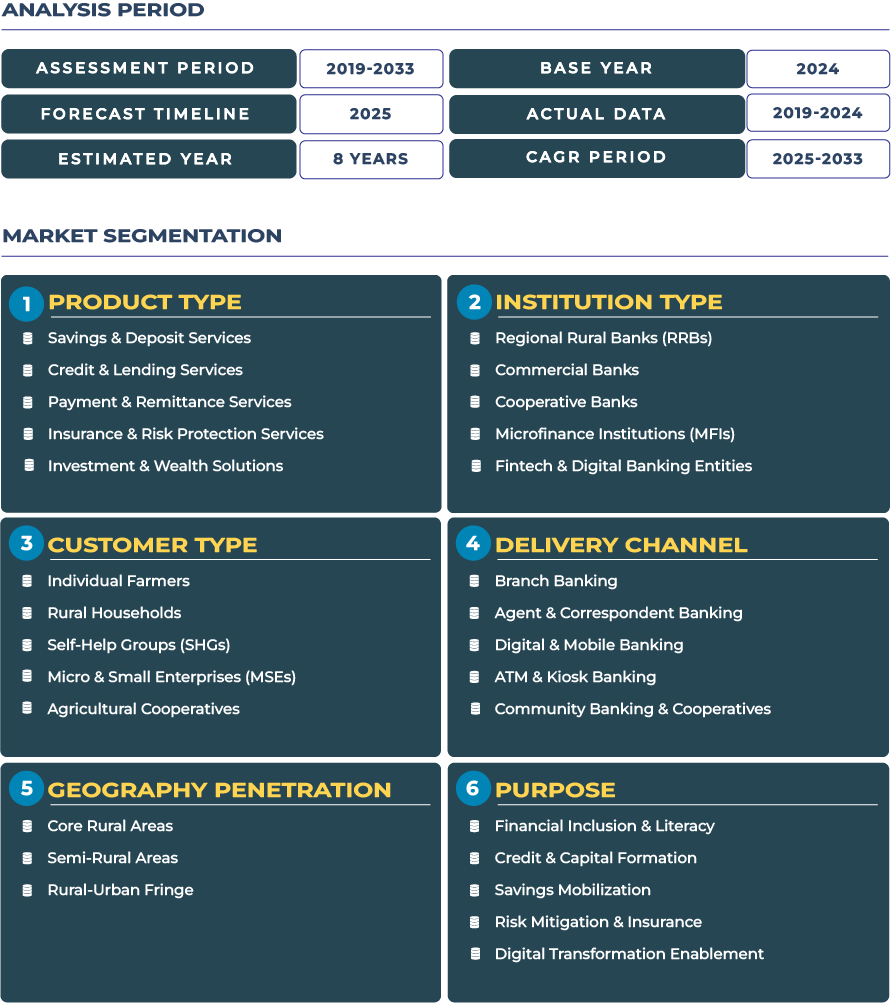Bahrain Rural Banking Market Outlook: Financing Agri-Tech Incubation and Regional Food Security Investments
The Bahrain rural banking market is shaping a distinct identity within the Gulf’s regional investment ecosystem by integrating agri-tech incubation, desalination-linked projects, and sovereign-backed food security finance. Despite its limited rural geography, Bahrain leverages its financial sophistication and regulatory agility to influence rural development trends across the GCC. The market’s strength lies not in agricultural volume, but in financial innovation that supports regional food systems, sustainability-oriented ventures, and fintech-led trade corridors. As of 2025, the Bahrain rural banking industry is valued at USD 556.3 million and is projected to reach USD 657.9 million by 2033, expanding at a modest CAGR of 2.1%. This trajectory reflects Bahrain’s focus on incubation-based finance and cross-border agri-investments rather than domestic agricultural scaling.
Note:* The market size refers to the total fees/revenue generated by banks through various services.
Bahrain Rural Banking Market Outlook: Bahrain’s Rural Banking System Nurtures Food-Security Finance and Agri-Tech Incubation
Bahrain rural banking ecosystem plays a catalytic role in aligning agriculture finance with the Kingdom’s wider ambition of food resilience and technological advancement. The Central Bank of Bahrain and Bahrain Bourse have developed frameworks encouraging financial institutions to mobilize capital into climate-resilient and resource-efficient ventures. With food imports constituting a large share of consumption, the government’s vision under Bahrain Economic Vision 2030 prioritizes financing models that support water-efficient farming, offshore farmland acquisition, and technology transfer to the rural sector.
Banks are increasingly focusing on credit and lending services for sustainable ventures, combining loan instruments with equity participation in agritech startups. Financial entities also facilitate insurance and risk protection services that hedge exposure to supply disruptions and climate variability. This innovation-driven approach ensures that rural banking contributes not just to local sustainability but also to Bahrain’s strategic role in regional food security and agri-investment flows.
Drivers & Restraints: Innovation in Agri-Finance Meets Structural Constraints
Sovereign-Backed Agri-Investment and Fintech Integration Drive Sectoral Growth
The growth of the Bahrain rural banking market is anchored in the Kingdom’s role as a regional financial hub that bridges capital and innovation. Sovereign wealth vehicles such as Mumtalakat are leading investments in agri-tech incubation platforms and rural export finance initiatives. These funds increasingly collaborate with family offices and fintech firms to deploy digital credit solutions across Gulf-wide agri-supply chains. Pilot projects linking rural exporters in Oman, Saudi Arabia, and Bahrain demonstrate how digital lending can facilitate cross-border trade in crops, fisheries, and food processing.
Furthermore, Bahrain’s fintech sector, under the regulatory sandbox initiative of the Central Bank of Bahrain, has enabled small rural cooperatives to access working capital through mobile-based microfinance platforms. These developments highlight Bahrain’s ability to combine digital efficiency with financial inclusion, a dual advantage that enhances its regional leadership in the rural banking sector.
Geographic Constraints and Import Reliance Temper Market Expansion
However, Bahrain’s limited rural geography remains a key restraint on domestic rural banking expansion. With only a small percentage of land suitable for cultivation, the scope for traditional agricultural lending remains constrained. The country’s heavy reliance on imported food creates limited onshore financing opportunities for crop-based enterprises. Additionally, small-scale rural enterprises often lack collateral, making them less attractive for long-term bank financing.
The rural banking industry is thus driven more by strategic regional participation than local volume. Institutions focus on offshore and regional agri-finance initiatives rather than purely domestic lending. These limitations, though structural, have prompted Bahraini banks to diversify into innovative financing models such as agri-insurance, blended finance, and export-linked investment structures.
Trends & Opportunities: From Gulf Trade Corridors to Offshore Food-Security Investments
Regional Trade-Finance Corridors Strengthen Bahrain’s Position in Rural Credit Networks
One of the most significant trends shaping the rural banking landscape in Bahrain is the establishment of Gulf-region trade-finance corridors. Bahraini banks are co-financing agricultural export deals alongside regional partners, facilitating access to working capital for small rural exporters across the GCC. These arrangements blend public funding with private-sector risk management, enhancing resilience within regional supply chains. The movement of agricultural produce between Bahrain, Saudi Arabia, and the UAE now benefits from structured trade-finance mechanisms developed through Bahrain’s financial sector innovation.
Agri-Tech Incubation and Offshore Investment Opportunities Expand Financial Reach
The market also presents growing opportunities in offshore investment products tied to food security. Bahraini banks and sovereign entities are designing financial instruments that channel institutional capital into farmland, desalination-linked farms, and vertical agriculture projects in partner nations. The emerging model of incubation loans supports startups in developing climate-resilient agriculture technologies, particularly desalination-linked hydroponics. By financing these ventures, rural banks are not only enhancing regional food resilience but also positioning Bahrain as an incubator of agritech excellence within the Gulf.
Competitive Landscape: Sovereign Funds and Banks Drive Regional Food-Security Finance
Bahrain rural banking market competitiveness stems from the convergence of sovereign-backed funds and commercial banking innovation. Bank of Bahrain and Kuwait (BBK) and Bahrain Islamic Bank have been active in developing specialized lending products targeting regional agricultural investment opportunities. These developments underscore Bahrain’s emphasis on financial solutions for sustainable sovereignty. By offering incubation loans linked to desalination technology and investment products that aggregate capital for institutional investors, banks are creating scalable models for food-security financing. The Bahrain rural banking industry is transitioning from being a niche segment to a regional innovation platform, emphasizing blended finance, ESG integration, and export-oriented investment strategies.







